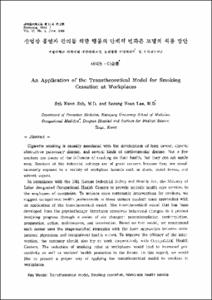산업장 흡연자 관리를 위한 행동의 단계적 변화론 모델의 적용 방안
- Keimyung Author(s)
- Suh, Suk Kwon
- Journal Title
- Keimyung Medical Journal
- Issued Date
- 1998
- Volume
- 17
- Issue
- 2
- Abstract
- Cigarette smoking is causally associated with the development of lung cancer, chronic obstructive pulmonary disease, and several kinds of cardiovascular disease. Not a few smokers are aware of the influence of smoking on their health, but they can not easily stop. Smokers at the industrial settings are of great concern because they are simultaneously exposed to a variety of workplace hazards such as dusts, metal fumes, and solvent vapors.
In compliance with the 1981 Korean Industrial Safety and Health Act, the Ministry of Labor designated Occupational Health Centers to provide periodic health care services to the employees of companies. To achieve more systematic interventions for smokers, we suggest occupational health professionals in these centers conduct team approaches with an application of the transtheoretical model. The transtheoretical model that has been developed from the psychotherapy literatures conceives behavioral changes as a process involving progress through a series of six changes: precontemplation, contemplation, preparation, action, maintenance, and termination. Based on this model, we recommend each center uses the stage-matched strategies with the team approaches between occupational health nurses. To improve the efficacy of the intervention, the company should also try to work cooperatively with Occupational Health Centers. The reduction of smoking rates in workplaces would lead to increased productivity as well as workers' health promotion in the future. In this regard, we would like to present a proper way of applying the transtheoretical model to smokers in workplaces.
- Alternative Title
- An Application of the T
ranstheoretical Model for Smoking Cessation at Workplaces
- Keimyung Author(s)(Kor)
- 서석권
- Publisher
- Keimyung University School of Medicine
- Citation
- 서석권 and 이승훈. (1998). 산업장 흡연자 관리를 위한 행동의 단계적 변화론 모델의 적용 방안. Keimyung Medical Journal, 17(2), 141–152.
- Type
- Article
- 파일 목록
-
-
Download
 17-141.pdf
기타 데이터 / 663.91 kB / Adobe PDF
17-141.pdf
기타 데이터 / 663.91 kB / Adobe PDF
-
Items in Repository are protected by copyright, with all rights reserved, unless otherwise indicated.